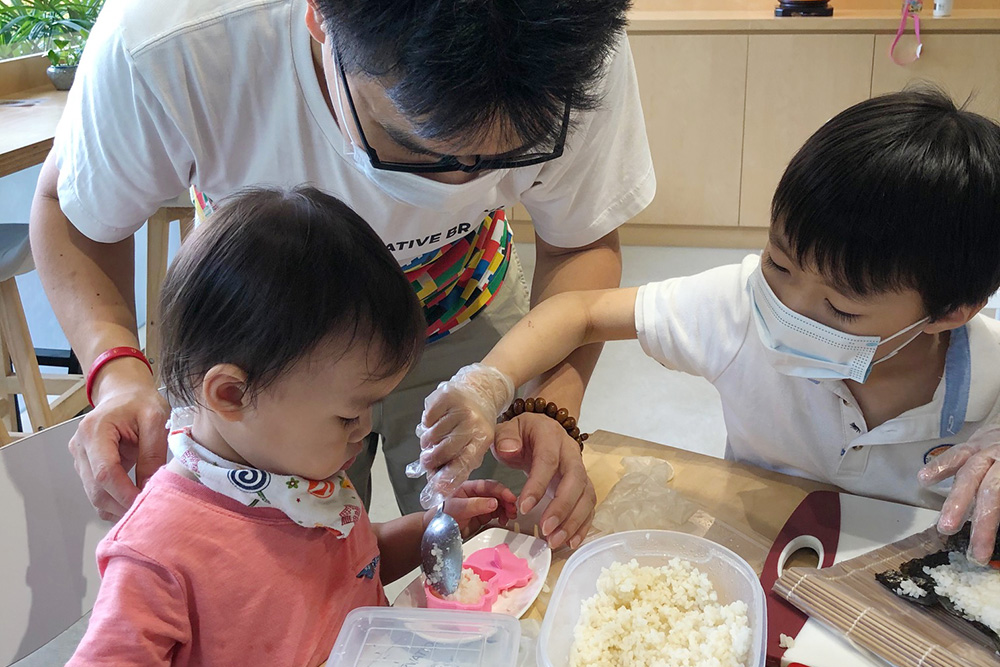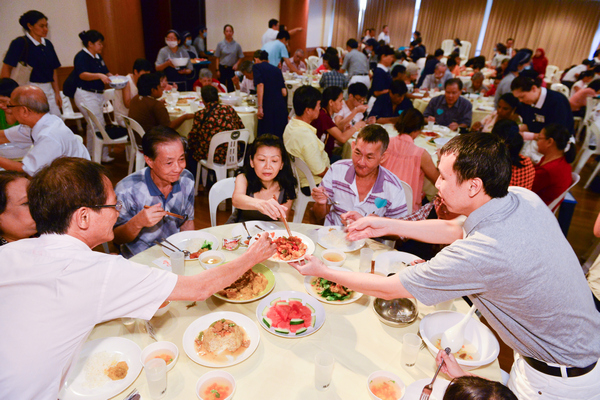Tzu Chi District Eco Team Leader, Tan Shi Yun (seated at the centre) shares ways to minimise plastic wastes. (Photo by Lai Tong Heng)
Plastic pollution is no longer news, scientists have been sounding the alarm on how plastic waste is affecting the environment especially the survival of wild animals for years. Governments and environmental protection organisations around the world have also been raising the awareness of the public on this environmental issue and trying to promote eco-friendly lifestyle. However, efforts to curb the problem is still too slow as plastic wastes are created much faster than they are recycled or reused. According to research carried out by National Geographic, plastic production has increased exponentially from 2.3 million tons in 1950 to 448 million tons in 2015. At the rate of how plastics are produced and disposed, it is estimated that by 2050, there will be more plastics than fishes in the ocean, such is the prediction from a report by Ellen MacArthur Foundation.
To address the pressing issue of plastic pollution, Tzu Chi Humanistic Youth Centre held its second youth webinar titled “Bubbles Double Plastic Trouble?” on 7 November 2020 via Zoom as well as YouTube broadcast. With “bubbles” referring to bubble tea, which are mostly served in plastic cups, the topic itself is a silent reminder of how people’s addiction to the convenience brought by plastic has turned into a crisis for the planet. The webinar started at 1.30pm sharp with Kelvin Wong as the moderator for Tzu Chi youth webinar series for the second time. Kelvin began the session by asking a key question, “Is plastic unavoidable?”

Behind the scenes at Tzu Chi Humanistic Youth Centre's Great Hall on the day of the webinar session. (Photo by Lai Tong Heng)
Can we live without plastics?
With its nature of being flexible, lightweight, durable, waterproof and hygienic, plastic has been useful in protecting products from contamination or damage. It is essential in preserving food and keeping them fresh for a longer time. Plastics are also widely used in the medical field where many medical tools and utensils are made for single use for hygiene purposes. With plastic use prevailing in almost every part of our daily life, mankind has reached the state which is practically impossible to live without the convenience of this chemical invention. However, excessive use and improper disposal of this convenient material has now turned into a major environmental crisis, making it no longer feasible for us to keep using it without some control.
Plastic is not our enemy, the key is how we use and reuse it
During the webinar, Nora Tan from Singapore Environment Council (SEC) shared that plastic is the fourth largest waste produced in Singapore. While there is a high rate of waste generation in Lion City, the nation also faces a stagnant waste recycling rate. According to the findings by the SEC, about one third of Singapore’s recycled wastes are exported overseas, and a huge amount of it are disposable plastics. As global demand for used plastics decreases, it is important to think of the waste flow in order to drive the country closer to a more circular form of consumption model.

“The idea is not about villainizing plastic material. The key is how we use it and how we responsibly dispose it,” said Nora Tan (on the right).
“Waste generation is expected to continue rising. It requires a shift in our mindset and our thinking on how we design our products,” said Nora. Before 2018, 30% of local recycled wastes were sent to China. Now that China has stopped accepting overseas recycled wastes, local businesses are forced to think about waste management strategies and find ways to address this issue locally.
Nora further mentioned about Singapore’s zero-waste vision for the country and the country’s goal to reduce daily waste sent to the Semakau landfill by 30% by the year 2030. To achieve this goal, businesses are encouraged to take ownership of the materials they introduce to the environment by placing responsibility on manufacturers to design systems that take back what they produce. To close the loop, there are also downstream innovations that focus on shredding plastics for 3D printing filaments to be used in the Industry Revolution 4.0 movement, using chemical recycling to transform PET bottles into fuel and turning plastics into shoes and t-shirts and useful construction materials such as bitumen replacement for tarring of roads.
Another effort to help consumers choose better is the Green Labelling Scheme. Nora shared that people are paying more attention to green procurement because our consumption and shopping choices can influence the amount of wastes that are generated. Apart from all the efforts mentioned above, the SEC is also trying to instil and implement a more conscious form of consumption by engaging with schools, businesses and the F&B industry.
“Take action, be a voice for this issue that you care about and make it an enjoyable process for yourself” – Nora Tan
Youth influences and youth actions in combating plastic pollution

(Screenshot of Natasha and Isabella’s webinar sharing by Chong Sin Yin)
With the goal of conserving the ocean for future generations, Isabella and Natasha Tanjutco who are cofounders of Kids For Kids and country representatives of Bye Bye Plastic Bags in the Philippines, have been focusing their effort to raise environmental awareness amongst youths as they think it is viable for the next generation to be involved in environment protection. The sisters have also cofounded TAYO (which means “us” in Filipino), a change consultancy that aims to unite creative and sustainable strategies for positive change. TAYO’s concept is about redesigning to make lasting goods with the future in mind. Instead of viewing used materials as wastes, they view them as resources that can be upcycled and turned into useful items. Under the Retaso programme, TAYO partners with several local brands and designers to collect textiles from communities and upcycling them into bags to provide an alternative to plastic bags.
Since 2015, their NGO have been organizing an annual art festival called Kamalayan with the aim of raising awareness on environmental issues in the Philippines. The youth organization also organizes series of talks and workshops called Habilin (which means “to give someone something for safekeeping” in Filipino) to bridge the gap of what schools are not teaching in the aspect of environmental issues.
Having conducted coastal cleaning activities, Isabella and Natasha Tanjutco realized that it is essential to push for systematic change such as persuading manufacturers to change their production for a more far reaching change to the consumers’ lifestyle habit. In order to achieve that, they use their creativity to translate environmental issues into easily digestible information for the public. Educational tools such as publications are also used to change the perception of the youths to counter plastic pollution.
“If you care about your friends, you should care about the environment.” – Tanjutco Sisters
Everybody can make a difference
After hearing about the plastic reduction solutions from the perspectives of the government and a youth NGO, the third panellist of the webinar, Tan Shi Yun shared more insights on what ordinary individuals can do in their daily life to help minimize plastic waste. Some of the useful tips which Tan shared are:
- Bring your own reusable shopping bags for shopping.
- Use reusable cutleries when eating out.
- Use reusable containers for food takeaways.
- When ordering food delivery, select food outlets that use reusable containers to deliver the food.
- For online shopping, lump your purchases from the same supplier so that you can reduce the amount of packaging materials used.
- Don’t take another plastic bag to carry a plastic bag home. For example, if the bread is already wrapped in a plastic bag, there is no need for another plastic bag to carry the bread.
- Expand the lifespan of the plastic packaging that come to your house by reusing the plastic containers such as washing detergent containers to refill detergent.
Tan also shared how she does her grocery shopping at the wet market; she would place all her groceries plastic-free into her basket and buy other loose items using CNY cookie jars which she brought from home. This practice has made her feel guilt free for not bringing any new plastic bags home.

Reusable cutleries and a reusable shopping bag that Tan Shi Jun brings with her everywhere she goes. (Photo by Lai Tong Heng)
As much as we hope to reduce the use of single use plastics, there are times when using single use plastics is unavoidable. This leads to a difficult question asked by one of the webinar participants, “How to throw away our rubbish without using plastic bags?”
Tan replied, “We need to put our rubbish at home into plastic bags because it would cause an even bigger hygiene issue if we throw our wastes directly into the chute in Singapore.”
She then shared a few tips on how to cut down on disposing single use plastics when it comes to waste management. First, we can separate wet waste from dry waste and sort out what we throw into the dustbin. If we notice that a lot of recyclables are thrown into the dustbin, we should sort the recyclables for recycling before throwing away the general wastes. Secondly, we should try to compress the waste so that the plastic bag can last a bit longer. In doing so, we may be able to stretch the “lifespan” of the garbage bag by reducing to only throwing away one plastic bag per week.
“Never underestimate your effort and power to change” – Tan Shi Yun
Striking a balance between convenience and sustainability
Tzu Chi Singapore has recently announced that the foundation is no longer accepting plastics at its eco recycling points and eco awareness centre. Due to the drop in oil prices, the demand for recycled plastics have dropped globally, leading to limited avenues for plastic wastes to be exported. Due to this, the foundation pledges to strengthen its environmental protection education to minimise local plastic wastes.
Although plastic is an important material in the modern world, there is actually no need for us to use that much of plastics in our daily life. By reducing single use plastics and practicing the 5R concept in our daily life, we will be able to balance the convenience and the impact of plastic wastes on the environment.
It takes the combination of manufacturing strategies, legislative measures and a shift of mindsets to tackle plastic wastes. As individual consumers, it would bring significant difference when more people are willing to think again before using and disposing plastics.


